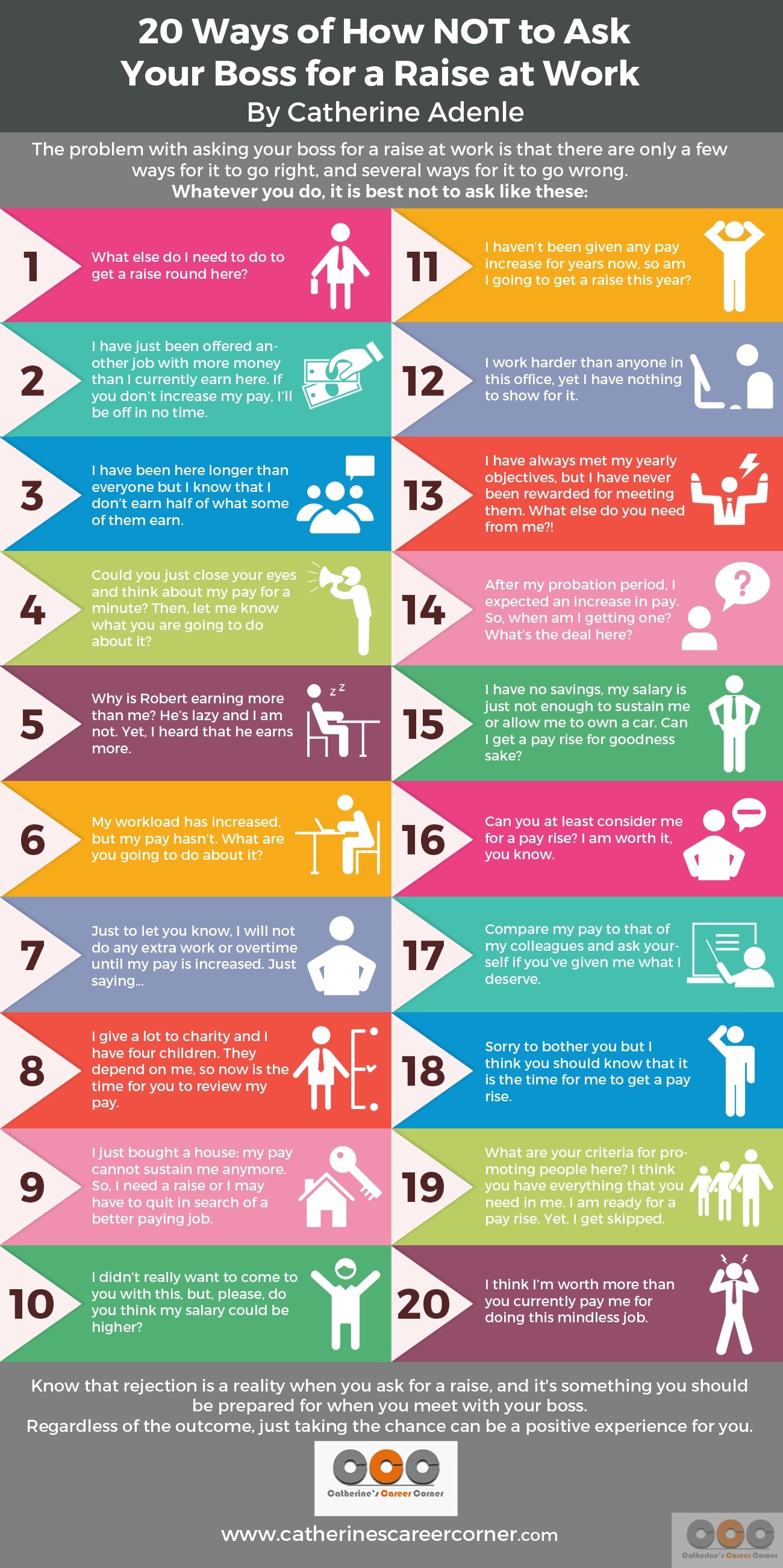Written by Catherine Adenle
Explore how not to ask for a pay rise at work. Asking for a pay increase could be nerve-wracking regardless of your position in an organisation. In this slow economy, it’s even a bit risky if you are not cautious about having a justifiable strategy when you ask for an increase in your pay. However, all great employees deserve to be paid based on their work and the value they add to any organisation.
As an employee, if you feel that you are truly due for a raise by working hard, adding value and picking up new and challenging projects, then, it may be best to ask your manager for an increase in salary.
Frankly, if you don’t ask, then you don’t get! It’s my belief that you can ask your manager for anything that you think you need to be able to contribute meaningfully to the organisation. Nevertheless, how you ask is what counts.
Whatever you do, when you ask for a pay rise, it is best not to ask like these:
Now that you’ve read the 30 ways of how not to ask for a pay rise, I am sure that you will agree with me that anyone who asks for a pay increase without thinking about how to do so beforehand may end up offending their manager in the process.
Infographic: 20 Ways of How NOT to Ask Your Boss for a Raise at Work

Pay Increase at Work: How Not to Ask
How to ask
Before you ask for a pay increase, be sure to do proper research in order to figure out if you are truly deserving of an increase in pay. If you are, then, what are you worth? Know what is fair and reasonable. It may require you using online-based resources like Payscale.com, Salary.com, Glassdoor.com or Getraised.com to find out what the going rate is for your profession considering your knowledge, experience, skills and other various factors.
Afterwards, if you know that you are underpaid, then, it may be time to negotiate an increase. Beforehand, you must find a time that works best for your manager and schedule a meeting with him.
See Asking for a Raise, Do These Things First
It’s imperative that you give your manager a head’s up that you want to chat about your career growth so that he has enough time to prepare.
Being fully prepared means you can get a lot out of him. You have to be prepared too as the conversation may be a little awkward or difficult.
Don’t go to your boss without knowing your achievements and how they contribute to the success of your team, manager or organisation. Go in with a list of your achievements, their dates and the results they generated and how they helped your team, manager or organisation to improve or succeed. Remember, these accomplishments don’t have to be big ‘game-changer’ stuff. Anything to do with streamlining, problem-solving, continuous improvement, increase in productivity, mentoring or training should be thrown in.
When you sit in front of your manager, start on a positive note by letting him know that you enjoy your role and working with him. Then, discuss the possibility of reviewing your pay based on the scope of work, roles and responsibilities. Focusing on your achievements, in a convincing manner, make the case for why you should be given a pay rise. Don’t threaten, mention any of your colleagues pay, curse, beg or act in an aggressive manner. Just state your case in an assertive manner and leave the rest with your manager.
If after six months, you don’t get an increase in pay without any explanation from your manager, ask him again in a polite manner.
If after another six months, your manager still hasn’t made any attempt to give you a pay rise without giving you any reasons, then it may be time for you to move to another department or look for another job. However, if you like your job, your colleagues and the company, think of the other benefits that you receive by working with your employer and wait until you are given a pay rise. Maybe a pay raise won’t work at that moment but you can ask for other things, extra personal days, development opportunities or increased in other allowances.
See the 9 Things That Motivate Employees More Than Money
So, now that you have explored how not to ask for a pay increase at work, what can you add? Have you asked for a pay rise in the past? If yes, how did you ask your manager? Let us hear from you. Leave your comment below.